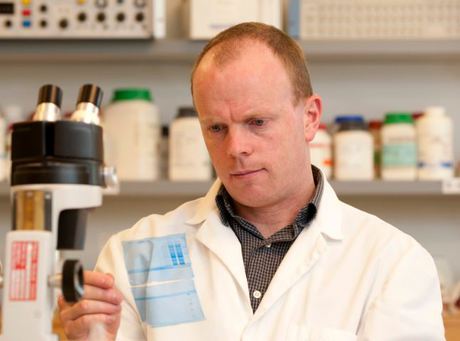Down syndrome gene points to the cause of diabetes

The genetics of individuals with Down syndrome have provided researchers with a method to identify a single gene that may be responsible for defective insulin secretion in type 2 diabetes.
The study was led by Flinders University, in collaboration with a team from the US, Sweden and the UK. The results have been published in the journal PLOS Genetics.
Because Down syndrome occurs when people have an extra copy of chromosome 21, they are prone to a range of health disorders resulting from the overexpression of particular genes. Some people with Down syndrome are diabetic from birth, said lead author Professor Damien Keating.
“Many individuals with Down syndrome experience lower insulin secretion, mitochondrial dysfunction and increased oxidative stress in the insulin-producing beta cells of the pancreas, which are all conditions that also appear in people with Type 2 diabetes,” Professor Keating said.
To identify genes duplicated in Down syndrome that contribute to problems with insulin secretion, the scientists screened the genes of four mouse models of the disorder. Two had high blood sugar and two did not, with the variation enabling a shortlist of 38 implicated genes to be identified.
The scientists then narrowed down the list by comparing it to genes overexpressed in beta cells from humans with Type 2 diabetes. This cross-referencing approach allowed the research teams to narrow down the candidates from a field of 5000 candidate genes to one, known as RCAN1.
“The comparison identified a single gene, RCAN1, which, when we overexpress it in mice, causes them to have abnormal mitochondria in their beta cells, produce less cellular energy and secrete less insulin in the presence of high glucose,” Professor Keating said.
The results not only explain why individuals with Down syndrome are more likely to have Type 1 diabetes, but reveal the function of a gene that may be playing a lead role in development of Type 2 diabetes in the general population. “We essentially developed this search approach associated with Down syndrome to whittle down our candidates, came up with a lead candidate and then identified that it does cause a lot of the problems that we see in humans with Type 2 diabetes,” Professor Keating said.
Professor Keating said the discovery has clear clinical implications for the design of drug treatments to improve the function of beta cells in the pancreas. As well as identifying a target for anti-diabetes drugs, he said the approach has the potential to be used for other health disorders with symptoms that also appear in individuals with Down syndrome, including heart conditions and Alzheimer’s disease.
Blood test could be used to diagnose Parkinson's earlier
Researchers have developed a new method that requires only a blood draw, offering a non-invasive...
Cord blood test could predict a baby's risk of type 2 diabetes
By analysing the DNA in cord blood from babies born to mothers with gestational diabetes,...
DNA analysis device built with a basic 3D printer
The Do-It-Yourself Nucleic Acid Fluorometer, or DIYNAFLUOR, is a portable device that measures...



